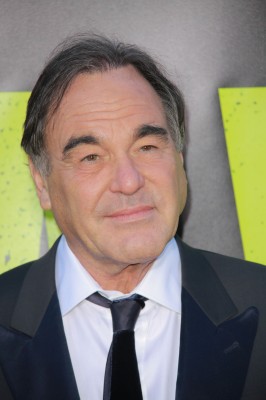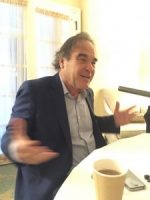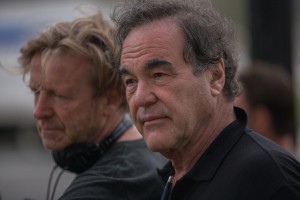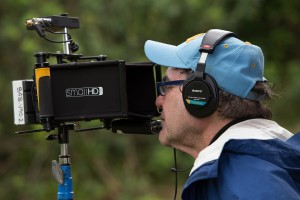By: izumi hasegawa September 14, 2016

Nixon, JFK, Born on the Fourth of July and Comandante… Oliver Stone is the director who never shies away from challenging subjects and has been causing movie-goers to raise their collective eyebrows at the United States for over a decade. And while Stone says himself that he’s not “chasing the news” and he prefers to “avoid these kinds of things” it makes perfect sense when the story of Edward Snowden was to be told, he was the man for the job.
 Q: The last time we spoke was years ago for Comandante, and since then Obama finally opened amnesty in Cuba. That being said, I feel you were a part of this change. So in relation to that, what was your first reaction to Edward Snowden?
Q: The last time we spoke was years ago for Comandante, and since then Obama finally opened amnesty in Cuba. That being said, I feel you were a part of this change. So in relation to that, what was your first reaction to Edward Snowden?
I was like every other citizen, I was, I think it was quite revelatory. And I applauded it as a citizen because I think transparency is what Obama promised. And it was Snowden who delivered it. It certainly was not Obama. Obama prosecuted eight whistleblowers under the Espionage Act. So he lied, or whatever you want to call it. He won a lot of votes, and people thought he was a change but he didn’t bring it. So the movie shows you Obama at different stages if you remember. You see the whistleblower and the President. But you’re asking, the question is, where was I? Yeah that’s where I was. But that’s not because I wanted to make a movie, on the contrary I stay away from current affairs. It was only because I got that phone call a few months later. Glen Greenwald asked me to look at his book. And I wasn’t interested, the one they had developed at Sony pictures. I was not interested at that point. It was only because of the phone call and the chance to meet Snowden, that’s why I went over there. So you understand what I am saying? I don’t know what you’re getting at. I am not chasing the news at all. Avoid these kinds of things.
 Q: How was the project started?
Q: How was the project started?
I was invited to Moscow by his lawyer. And one of the things was he had written a book, a fiction book about him. American defector comes to Russia in exile running from the intelligence community who are chasing him. Meets with a lawyer and they have a series of discussions in a basement, which never happened. But it’s a very fanciful but interesting novel. And it has Dostoevsky like long conversations in Russian style about the Orwellian state. And what you do to resist this kind of mindset. And fascinating but fiction. I met with him, first visit in late January and he was weary and I was weary because I didn’t know if I wanted to get involved. These contemporary stories are so difficult because things happen. Lawsuits out of the blue. Some new news that the current blows in the other way. We didn’t know. It takes a year, two years to make a movie. It took two and a half in this case. So what would happen? It could’ve blown up in our face. It still can by the way we have three weeks to go, or two weeks to go. So I wouldn’t recommend it. I waited until Nixon died. Anyways, so no that didn’t happen. I think it took time to get to know each other, break the ice. And we could’ve gone fiction. I knew that in my head, I always had that option, if I am going to do this I can go a James Bond road and make him into a, for example, you could have him eluding pursers in Russia. Or you can have him even hiding in the United States, he sneaks back in and he hides in Kansas or something. There are all kinds of story lines you can follow. So that’s a possibility. And you can tell the story that way and make these somewhat similar points. But as I got to know him and, I went back two more times to Moscow. By May, I felt like he would cooperate, and he was giving us very, very interesting information. So I brought Kieran back, Kieran Fitzgerald, my co-writer, and he shared a lot with us. And he trusted us. And I think he took us all the way through. Basically, we kept going back. I went 9 times to Moscow. So we had several very, very, very helpful. And we also talked to the public record. I mean we consulted, there was a lot of journalism, a lot of it was inaccurate. There was a book from the Guardian. Even that was not all right. It’s been corrected now. The book, for the record, it’s been corrected, there’s a revised addition. But there’s a lot of things that are breaking news. So it’s hard to put that story together from all these sources. We spoke to witnesses, we spoke to people that knew him.
 Q: Did he ever imply or request for a certain direction of the film to go in?
Q: Did he ever imply or request for a certain direction of the film to go in?
No, he never imposed. He would be critical of the resulting. But he never said, no I want to get this point across. His actions had been his point. And he was very modest about it remember in Hong Kong and right at that time. If he could he would have kept his name out of it, but the whole point of the thing was to make himself visible to say I did this and I did it knowingly and I’m responsible for it. But this is what I believe. My conscious says that there’s a higher law than this and this NSA law, my oath to the constitution. So he had to get himself known and when he made himself known that’s a key moment. I am Edward Snowden. I am Edward Snowden on TV. He was giving up everything you understand. His family, above all, Lindsay Mills (Snowden’s girlfriend), and he had to end that relationship, he thought he had to end it. And he did. And then of course things turned out pretty wild for him because she did stick with him and go back to Moscow
 Q: How did you pick Joseph Gordon-Levitt to play Snowden?
Q: How did you pick Joseph Gordon-Levitt to play Snowden?
First choice, always first choice. I just felt. I didn’t know him at all. I’ve seen him in movies. And just felt he could do it. He felt like the guy. He’s also computer addicted and had been on, had done a lot of twitter. I just thought there was something about him that felt right. Perfect. I never doubted it all the way through. It’s funny, usually a little chase with actors. But no one else could have done it in my opinion the same way.
 Q: What’s the dramatic link between this and films like JFK and Nixon, which dealt with the lack of transparency or shadow areas if you will, in areas of the government?
Q: What’s the dramatic link between this and films like JFK and Nixon, which dealt with the lack of transparency or shadow areas if you will, in areas of the government?
That’s for sure. Above all, yeah, I think JFK. Definitely. Shadow areas is a good word. This was an enormous revelation that he did. These programs are far more complicated and significant than we even know at that time. I think when you explore, there are so many program names. First of all, very few people can get into that depth. And we learned not only about illegal mass surveillance all over the world. But we also learned about cyber warfare. He was one of the first to break this news, that what we were doing there, and that was Obama’s initiative. It was called I think at that point, it was called Boundless Informant. Well its beyond boundless now, it’s reached insanity proportions. We hacked, we cyber warfare, we declared cyber warfare without admitting it on Iran in 2007 with the Stuxnet virus which never stopped. We boasted about it but the truth was, it was a disaster. And they kept going. And they opened up the gates on a new weapon. Much like the atomic bomb did in 1945. Where if you remember correctly, Truman said, “We’ll keep this a secret” to Oppenheimer. It was bullshit, Oppenheimer said, “They’ll never keep this a secret.” It’s gonna be found. I mean people are not stupid. Same thing has happened with cyber warfare. So we miscalculated on this one again. This is really a terrible weapon. Terrible weapon. Because we won’t know where the war comes from, we won’t know what the electronic interference is, it will just happen. And no one will make accusations, Russia, this, that. But you can’t tell, and it’s really tough. And what happens is that war results. And I think that Snowden has put his finger on a lot of stuff.
Snowden opens theaters nationwide on September 16th
Interview by Izumi Hasegawa (@HNW_Izumi)
Edited by Jody Taylor (@RealJodyTaylor)
Follow Whats Up Hollywood on Twitter @WhatsUpHWood
